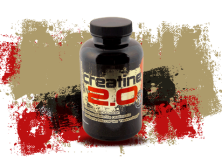A review of creatine supplementation in age-related diseases: more than a supplement for athletes.

Creatine is an endogenous compound synthesized from arginine, glycine and methionine. This dietary supplement can be acquired from foodsources such as meat and fish, along with athlete supplement powders. Since the majority of creatine is stored in skeletal muscle, dietary creatine supplementation has traditionally been important for athletes and bodybuilders to increase the power, strength, and mass of the skeletal muscle. However, new uses for creatine have emerged suggesting that it may be important in preventing or delaying the onset of neurodegenerative diseasesassociated with aging. On average, 30% of muscle mass is lost by age 80, while muscular weakness remains a vital cause for loss of independence in the elderly population. In light of these new roles of creatine, the dietary supplement’s usage has been studied to determine its efficacy in treating congestive heart failure, gyrate atrophy, insulin insensitivity, cancer, and high cholesterol. In relation to the brain, creatine has been shown to have antioxidant properties, reduce mental fatigue, protect the brain from neurotoxicity, and improve facets/components of neurological disorders like depression and bipolar disorder. The combination of these benefits has made creatine a leading candidate in the fight against age-related diseases, such as Parkinson’s disease, Huntington’s disease, amyotrophic lateral sclerosis, long-term memory impairments associated with the progression of Alzheimer’s disease, and stroke. In this review, we explore the normal mechanisms by which creatine is produced and its necessary physiology, while paying special attention to the importance of creatine supplementation in improving diseases and disorders associated with brain aging and outlining the clinical trials involving creatine to treat these diseases.
Smith RN, Agharkar AS, Gonzales EB et Al.
F1000Res. 2014 Sep 15;3:222.


